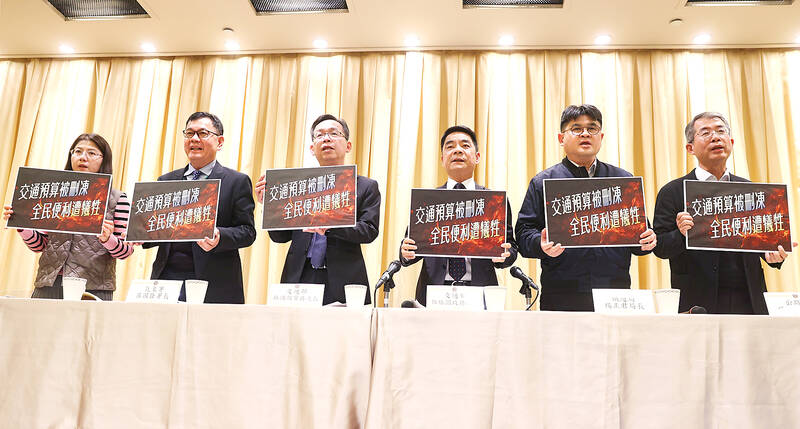Budget cuts would greatly hinder the Central Weather Administration’s (CWA) ability to provide daily weather forecasts and undermine the Highway Bureau’s efforts to boost the use of public transportation, the Ministry of Transportation and Communications said yesterday.
The legislature has eliminated about NT$610 million (US$18.6 million) from the ministry’s budget and frozen another NT$11.7 billion.
A large percentage of the eliminated budget would have been used to invest in new transportation facilities and upgrading existing ones, the ministry said.

Photo: CNA
About NT$6.86 billion of the Highway Bureau’s budget has been frozen by lawmakers, the highest amount among all agencies under the ministry, it said.
The frozen funds include NT$2 billion that was allocated to improve highways and vehicle management systems, and NT$4.86 billion to build and maintain highways.
The legilsature also froze NT$7.47 billion and NT$3.37 billion from the Tourism Administration’s and CWA’s budgets respectively, it said.
The ministry could only access the frozen funding after securing the legislature’s approval.
“However, the opposition parties have set stringent criteria to unfreeze the funding. Failure to release the funds would make it difficult for the ministry to implement policies as planned,” it said in a statement.
The ministry held a news conference in Taipei yesterday to show how agencies would be affected by the slashed budget.
“In the past few years, we have built many stations to observe and forecast severe weather. We halso use a supercomputer to provide more accurate weather forecasts. We are planning to incorporate artificial intelligence in our forecasts for severe weather. The budget cut, which reduces funding for utility fees, equipment maintenance fees and other key expenses at the CWA, would prevent the supercomputer from being able to offer data instantly and would compromise the data quality,” CWA Administrator Lu Kuo-chen (呂國臣) said.
The CWA said that the budget cut would also create obstacles for its plan to build new facilities to accommodate servers for the supercomputer in the weather station in Hsinchu County, adding that its plan to build seventh, eighth and ninth-generation supercomputers would have to be postponed.
The agency had planned to lay an undersea cable in the waters south of Taiwan to detect earthquakes, but the budget cut would impede its construction and even compromise the maintenance of existing cables, it said.
The cut would also affect the regular maintenance of 700 weather and earthquake observation stations nationwide, it added.
In addition to the NT$6.86 billion frozen by the legislature, the Highway Bureau’s budget was cut by NT$2.65 billion.
The bureau would no longer be able to subsidize city or freeway buses, which could prompt bus operators to cancel some unprofitable lines, Highway Bureau Director-General Chen Wen-jui (陳文瑞) said.
The reduced funding for utilities would compromise service quality at motor vehicle offices nationwide, Chen said.
The bureau would also be left without extra funding to improve the designs of bottlenecks at certain highway sections and maintain 5,300km of highways and expressways, he said.

POSITIVE DEVELOPMENT: Japan and the US are expected to hold in-depth discussions on Taiwan-related issues during the meeting next month, Japanese sources said The holding of a Japan-US leaders’ meeting ahead of US President Donald Trump’s visit to China is positive news for Taiwan, former Japan-Taiwan Exchange Association representative Hiroyasu Izumi said yesterday. After the Liberal Democratic Party’s landslide victory in Japan’s House of Representatives election, Japanese Prime Minister Sanae Takaichi is scheduled to visit the US next month, where she is to meet with Trump ahead of the US president’s planned visit to China from March 31 to April 2 for a meeting with Chinese President Xi Jinping (習近平). Japan and the US are expected to hold in-depth discussions on Taiwan-related issues during the

‘LIKE-MINDED PARTNER’: Tako van Popta said it would be inappropriate to delay signing the deal with Taiwan because of China, adding he would promote the issue Canadian senators have stressed Taiwan’s importance for international trade and expressed enthusiasm for ensuring the Taiwan-Canada trade cooperation framework agreement is implemented this year. Representative to Canada Harry Tseng (曾厚仁) in an interview with the Central News Agency (CNA) said he was increasingly uneasy about Ottawa’s delays in signing the agreement, especially as Ottawa has warmed toward Beijing. There are “no negotiations left. Not only [is it] initialed, we have three versions of the text ready: English, French and Mandarin,” Tseng said. “That tells you how close we are to the final signature.” Tseng said that he hoped Canadian Prime Minister Mark Carney

Taiwan has received more than US$70 million in royalties as of the end of last year from developing the F-16V jet as countries worldwide purchase or upgrade to this popular model, government and military officials said on Saturday. Taiwan funded the development of the F-16V jet and ended up the sole investor as other countries withdrew from the program. Now the F-16V is increasingly popular and countries must pay Taiwan a percentage in royalties when they purchase new F-16V aircraft or upgrade older F-16 models. The next five years are expected to be the peak for these royalties, with Taiwan potentially earning

President William Lai (賴清德) yesterday bestowed one of Taiwan’s highest honors on Saint Vincent and the Grenadines (SVG) Ambassador Andrea Clare Bowman in recognition of her contributions to bilateral ties. “By conferring the Order of Brilliant Star with Grand Cordon on Ambassador Bowman today, I want to sincerely thank her, on behalf of the Taiwanese people, for her outstanding contribution to deepening diplomatic ties between Taiwan and SVG,” Lai said at a ceremony held at the Presidential Office in Taipei. He noted that Bowman became SVG’s first ambassador to Taiwan in 2019 and